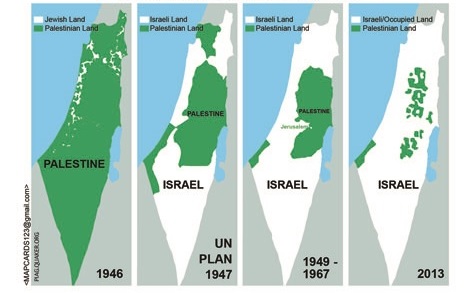In the January 1984 issue of Palestine Perspectives, Muhammad Hallaj wrote an editorial entitled "Injustice is Never Irreversible" that addressed the then current topic of annexation or de facto annexation of the Occupied Territories.
Dr. Hallaj raised two questions:
1. Does military occupation become "irreversible?" In our view it does not. The forceful subjugation of one people by another cannot acquire legitimacy due to the unilateral act of the occupier, although such acts may very well make the withdrawal symptoms more severe.
2. The second question which needs to be raised is this: what happens to the Arab-Israeli conflict if Israel's de facto annexation of the occupied West Bank and Gaza does become "irreversible?"
Hallaj recognized the possibility that, given the vastly unequal balance of power, such possibility exists.
In that case only what Israel wants would be achievable. But in that case it makes no difference what the Palestinians do, because Israel is dead set against Palestinian self-determination—with or without association with Jordan—as its immediate and categorical rejection of the Reagan scheme and as its refusal even to discuss the cessation of settlement demonstrates.
However, it behooves those who advise the Palestinians to swallow whatever it is that is being shoved down their throats, as a presumed alternative to oblivion, to consider another theoretical possibility which is transformable into a practical option...the struggle with Israel would cease to be over the West Bank and would become again a struggle over Palestine. In other words, instead of closing the file on the Palestinian people, Israel's annexation of the West Bank and Gaza would re-open the file from the beginning.
In the nearly 37 years that have elapsed since the writing of the editorial, much has remained the same: the Israelis still talk of annexation, and they are still supported by the powers that be in the United States. Unfortunately, that does not mean we have come full circle, stuck in a repeating cycle. The Palestinian position has weakened in the interim.
The West Bank struggles with the stranglehold Israel has over the water supply, not to mention the supply lines of everything else that it needs to continue life as usual. Outside help wanes as economies around the world face uncertainty in the face of a continuing pandemic.
The situation in Gaza is desperate. After years of blockade in conjunction with continuous and violent suppression, the people of Gaza struggle to survive. Electricity is intermittent due to the scarcity of fuel for the power plant; medicines of all sort are in sort supply; the water treatment plant languishes in scarce energy and maintenance hampered by lack of parts. The hospitals struggle to meet the day-to-day needs of the community, yet they are called upon to reach even greater demand by recurring violence and now the worldwide struggle with covid-19 adds to the misery.

No comments:
Post a Comment